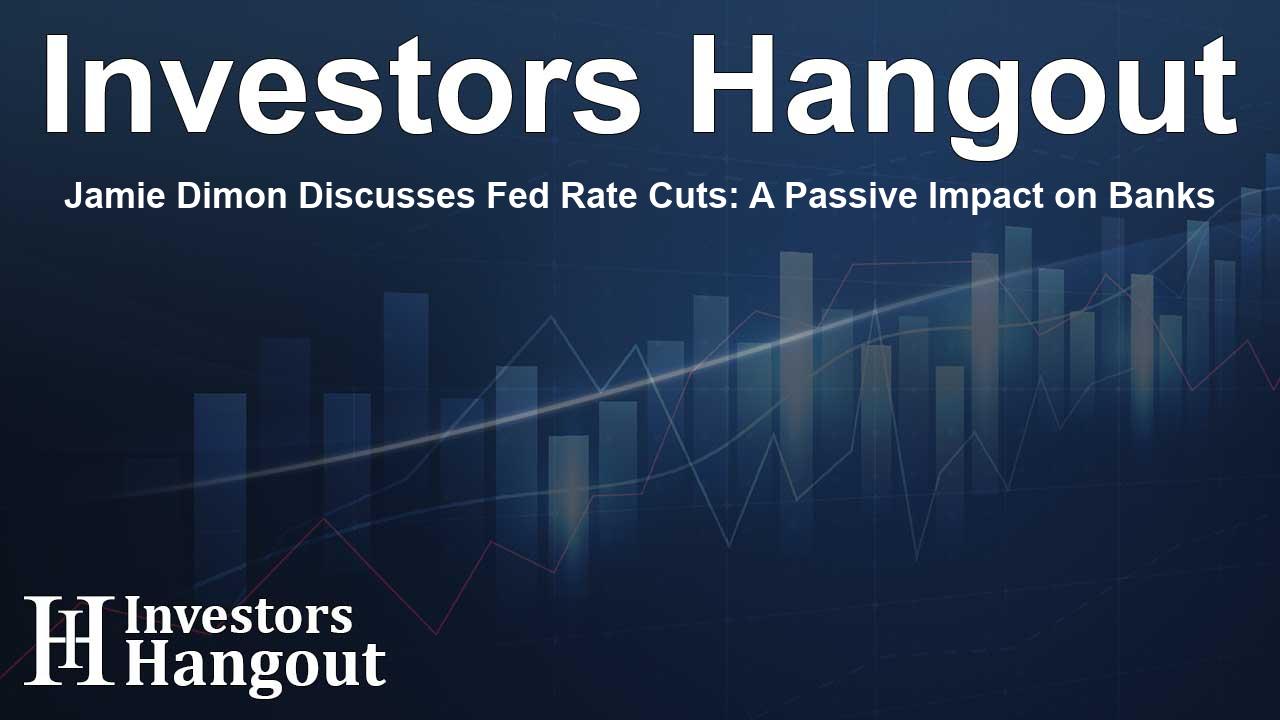Jamie Dimon Discusses Fed Rate Cuts: A Passive Impact on Banks

Jamie Dimon's Take on the Federal Reserve's Decisions
Jamie Dimon, the prominent CEO of JPMorgan Chase, has adopted a laid-back stance regarding the Federal Reserve's forthcoming decisions. He believes that regardless of whether the Fed opts for a modest 25 basis point cut or a more substantial 50 basis point reduction, these choices will not drastically reshape the banking environment.
Minimal Impact of Rate Changes
Speaking at a recent conference at Georgetown University, Dimon remarked, "It's not going to be earth-shattering. It doesn’t mean that much." His remarks illustrate a broader understanding of the economy's true health, indicating that, ultimately, real economic activities are what really count, regardless of interest rate adjustments.
He further explained that while changes in rates may attract attention, the actual economic situations overshadow these tweaks, positioning the Federal Reserve's actions as relatively insignificant when considering the larger economic landscape.
Backing for Current Monetary Policy
While he maintains a relaxed attitude towards the possibility of rate cuts, Dimon expressed support for the Fed's easing policy and commended Jerome Powell's leadership. He affirmed the importance of the Fed's actions by stating, "I think they need to do it. And I think that Jay Powell does do a great job.”
Still, he's cautious. Dimon has previously indicated that the U.S. economy might face some weaknesses that many onlookers haven't yet recognized. His insights provide a prudent and realistic perspective, especially regarding the risk of stagflation—where inflation remains high but economic growth is stagnant, leading to rising interest rates.
Skepticism About Inflation Predictions
Given the latest economic indicators, Dimon reiterated his doubts about inflation returning to the Fed's target of 2%. He pointed out that the likelihood of entering a recession seems greater than of achieving a stable economic future. His concerns resonate, particularly considering current inflation levels and fluctuations in employment.
Implications for JPMorgan's Financial Future
Any potential rate cuts are likely to directly affect JPMorgan. Daniel Pinto, the bank's COO, recently raised eyebrows among investors by suggesting that the bank's projected earnings of $94 billion for 2025 might be overly ambitious due to falling interest rates.
Pinto acknowledged that while the forecasts for the bank's financial health remain ambiguous, it's probable that the expected rise in expenses from inflation, combined with decreasing net interest income, will pose challenges to profitability moving forward.
Understanding Net Interest Income
Net interest income is critical for banks, as it represents the earnings on loans and securities minus what they pay out in deposits. The anticipated decline in this income, driven by possible interest rate cuts, will be vital for JPMorgan's efforts to maintain its financial growth.
Dimon's Critique of Regulatory Challenges
Dimon has been vocal about the regulatory hurdles as well. He has criticized new capital regulations intended to shield banks from losses, arguing that these processes are often drawn out unnecessarily. Even after a recent adjustment that eased some capital increase requirements, he feels that the regulatory landscape still needs significant reform to improve efficiency.
Looking Ahead to Future Changes
As major changes take place in the regulatory environment, prominent banks like JPMorgan are gearing up for the Fed's comprehensive proposal, expected to include numerous revisions and in-depth evaluations. Dimon highlighted the need for sound implementation instead of just seeking leniency in regulations.
His insistence on maintaining high standards reflects his commitment to ensuring banks are prepared for any potential economic downturns, balancing the need for both stability and proactive adaptations.
Frequently Asked Questions
What are Jamie Dimon's views on the Federal Reserve's rate cuts?
Jamie Dimon thinks that the Federal Reserve's rate cuts will have a minor effect on the overall economy but supports these cuts as necessary under current circumstances.
How might JPMorgan be affected by the rate cuts?
JPMorgan could experience a drop in its net interest income, which is crucial for profitability, as interest rates decrease and costs rise.
What is Dimon's take on the U.S. economic vulnerability?
Dimon cautions that the U.S. economy could be more vulnerable than many market observers recognize, highlighting concerns about stagflation and inflation rates.
Why does Dimon criticize the new capital regulations?
He criticizes the regulatory timeline for being excessively slow and argues that the processes should be expedited to better equip banks for future challenges.
What is expected from the Fed's upcoming proposal?
The Fed's proposal is expected to include substantial revisions to existing banking standards, along with a quantitative impact assessment, aiming to clarify the future requirements for banks.
About The Author
Contact Dylan Bailey privately here. Or send an email with ATTN: Dylan Bailey as the subject to contact@investorshangout.com.
About Investors Hangout
Investors Hangout is a leading online stock forum for financial discussion and learning, offering a wide range of free tools and resources. It draws in traders of all levels, who exchange market knowledge, investigate trading tactics, and keep an eye on industry developments in real time. Featuring financial articles, stock message boards, quotes, charts, company profiles, and live news updates. Through cooperative learning and a wealth of informational resources, it helps users from novices creating their first portfolios to experts honing their techniques. Join Investors Hangout today: https://investorshangout.com/
The content of this article is based on factual, publicly available information and does not represent legal, financial, or investment advice. Investors Hangout does not offer financial advice, and the author is not a licensed financial advisor. Consult a qualified advisor before making any financial or investment decisions based on this article. This article should not be considered advice to purchase, sell, or hold any securities or other investments. If any of the material provided here is inaccurate, please contact us for corrections.
